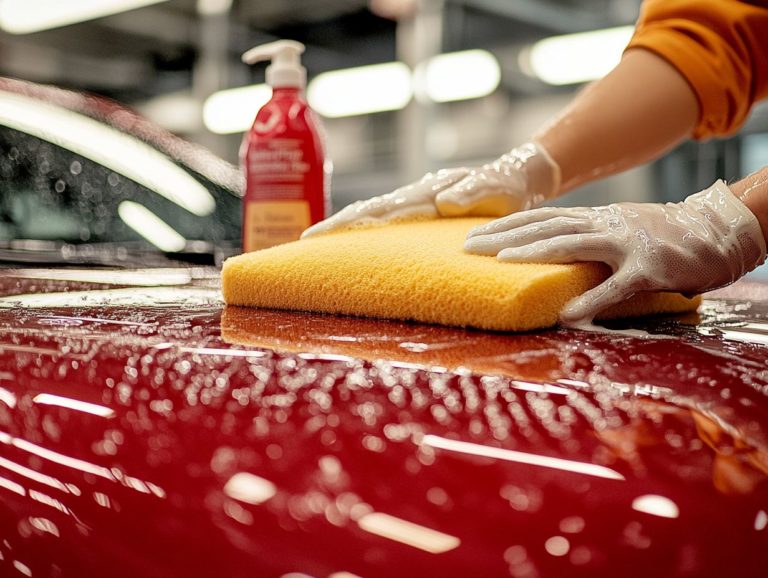How to Extend the Life of Your Tires
Your tires deserve the best care! Let s dive into how you can keep them in perfect shape. Tires are the unsung heroes of your vehicle, quietly supporting every drive and ensuring your safety on the road.
It s easy to overlook the importance of proper tire care, but neglecting it can lead to premature wear and costly replacements. This article explores why maintaining your tires is crucial, covering everything from regular inspections and rotations to knowing when it s time for a replacement.
You ll find valuable tips for extending their lifespan, along with insights tailored to different tire types. Keep reading to ensure your tires are always in top shape for the journeys that lie ahead.
Contents
- Key Takeaways:
- The Importance of Maintaining Your Tires
- Regular Tire Maintenance
- Tire Replacement
- Tips for Extending Tire Life
- Special Considerations for Different Types of Tires
- Frequently Asked Questions
- 1. How can I extend the life of my tires?
- 2. Why is it important to maintain proper tire pressure?
- 3. How often should I rotate my tires?
- 4. Can I extend the life of my tires by avoiding sharp turns and abrupt stops?
- 5. Does the type of tire I choose affect its lifespan?
- 6. What should I do if I notice abnormal wear on my tires?
Key Takeaways:
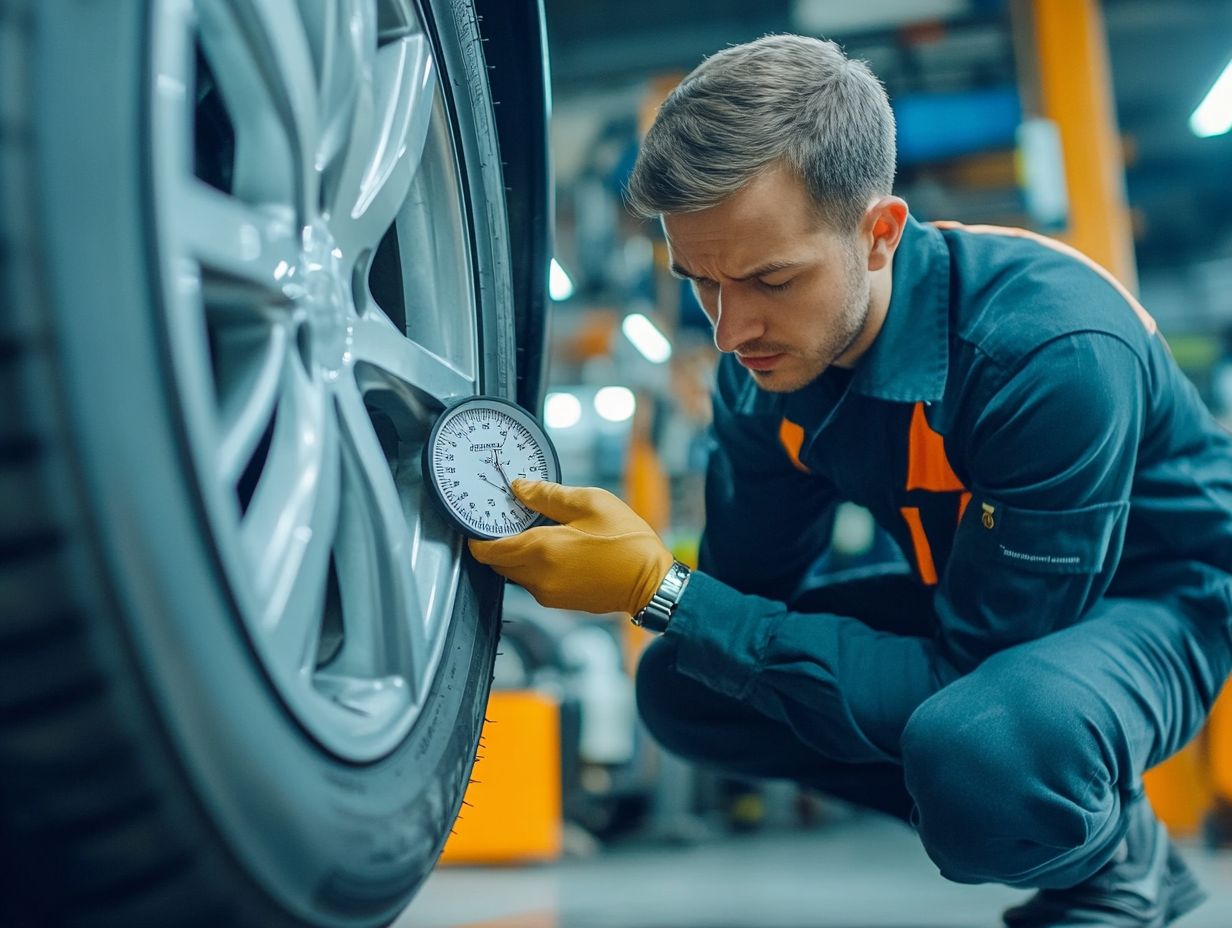
- Keeping up with tire care is key to making them last longer!
- Proper inflation, regular rotations, and visual inspections are key to keeping your tires in good condition.
- Understanding when to replace your tires and adjusting your driving habits can greatly impact their longevity.
The Importance of Maintaining Your Tires
Maintaining your tires is essential for achieving the best driving experience and ensuring your vehicle s safety, fuel efficiency, and longevity.
Regular tire maintenance like checking tire pressure, rotating tires, and ensuring proper alignment can prevent wear and tear, enhance handling, and even boost your gas usage.
Prioritizing tire care is vital for a smooth driving experience, especially when navigating different road conditions. For those in Peoria, AZ, enlisting the expertise of certified technicians can elevate your tire service standards, offering you peace of mind as you hit the road.
Why Proper Tire Care Matters
Proper tire care is essential for your vehicle’s safety, as it directly influences tire tread, handling, and overall fuel efficiency. Tread depth refers to the measurement of the grooves on your tire, crucial for safe driving.
By regularly monitoring tire tread depth and ensuring adequate inflation, you’re not just enhancing your vehicle’s handling on various road surfaces; you significantly reduce the risk of blowouts or skidding in adverse weather conditions. This meticulous attention to tire maintenance can dramatically boost your vehicle’s responsiveness, allowing you to steer and stop with greater effectiveness.
Well-maintained tires operate more efficiently, which positively impacts your gas usage. This is crucial for saving money at the pump and minimizing your environmental footprint. Neglecting simple maintenance tasks can compromise your safety and diminish performance, ultimately leading to a less enjoyable driving experience.
Regular Tire Maintenance
Regular tire maintenance is crucial for maximizing both the lifespan and performance of your tires. This includes essential practices like tire rotation, consistent checks of tire pressure, and comprehensive inspections to detect any signs of wear or damage that could jeopardize your safety on the road.
By prioritizing these measures, you ensure a smoother, safer driving experience.
Tire Rotation and Pressure Checks
Tire rotation and regular pressure checks are essential for maintaining your tires. They help ensure even tread wear and optimal performance.
By systematically changing the position of each tire, you can effectively mitigate uneven wear, prolonging their lifespan and boosting your overall driving safety. It s essential to conduct monthly inspections of your tires to keep tabs on both rotation and pressure levels. Experts suggest checking tire pressure at least once a month or before embarking on long trips.
Driving on underinflated tires not only accelerates wear but also undermines fuel efficiency and handling. Overlooking these straightforward measures can heighten risks on the road, making regular tire care a crucial element of responsible vehicle ownership. Don t wait! Check your tires today to ensure a safe journey tomorrow!
Visual Inspections
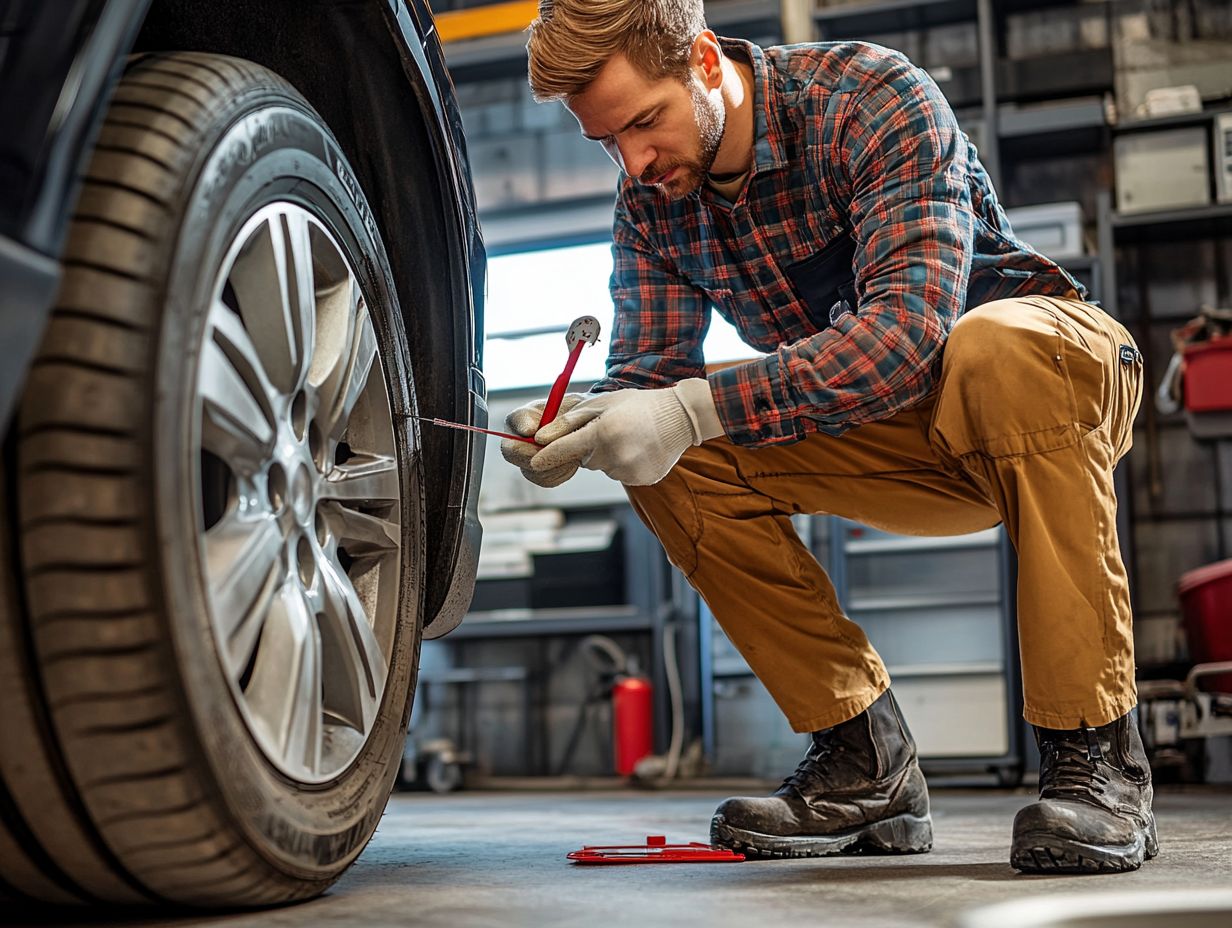
Visual inspections are vital for tire maintenance. They help you spot uneven wear, tread issues, and other problems that can affect safety and performance.
Make it a habit to check your tires regularly for safety! Look closely at how deep the tire grooves are, which is essential for keeping traction in different driving conditions. Watch out for visible signs of damage like cracks, bulges, or punctures to help prevent dangerous situations.
Prioritizing these visual checks can significantly enhance your vehicle’s safety and performance. This ensures your tires work effectively and contribute to a smooth driving experience.
Tire Replacement
Tire replacement is a crucial part of vehicle maintenance that discerning vehicle owners should prioritize. It is especially important when tread depth dips below safety standards or when tires show noticeable signs of wear.
Knowing when to replace your tires can avert dangerous situations and guarantee optimal driving conditions, enhancing your safety and driving experience.
When to Replace Your Tires
Understanding when to replace your tires is crucial for your vehicle’s safety and performance. Pay attention as tire grooves approach critical levels.
Tire grooves help your car grip the road, especially in bad weather. Regularly inspect your tires for visible wear patterns like uneven wear or bald spots. Remember, tires generally last six to ten years, regardless of how deep the grooves are.
Neglecting these signs can lead to serious issues, such as compromised grip, longer stopping distances, and increased risk of hydroplaning or blowouts. Ultimately, this could jeopardize your safety and overall driving experience.
Tips for Extending Tire Life
Extending the life of your tires is not just a savvy financial move; it significantly enhances your vehicle’s safety. To learn more about this, focus on key practices like maintaining proper inflation, adopting effective driving habits, and investing in regular tire care.
These steps help prevent premature tire wear and ensure your tires serve you well for the long haul.
Proper Inflation and Loading
Maintaining proper air pressure and following load capacity guidelines is essential for optimal tire performance and longevity. The right inflation levels directly affect handling and safety, enhancing your driving experience while reducing accident risks.
When your tires are correctly inflated, they provide better traction, allowing your vehicle to respond promptly to steering inputs and minimizing stopping distances. Use a reliable pressure gauge and check your vehicle s manual or the sticker on the driver s side door for the manufacturer s recommended pressure.
It s also important to follow load capacity guidelines. Overloading can lead to increased wear and potential tire failure, compromising both performance and safety. Prioritizing these factors will keep you and your passengers safe while maximizing the lifespan of your tires.
Start checking your tires today to ensure your safety on the road!
Driving Habits that Affect Tire Wear
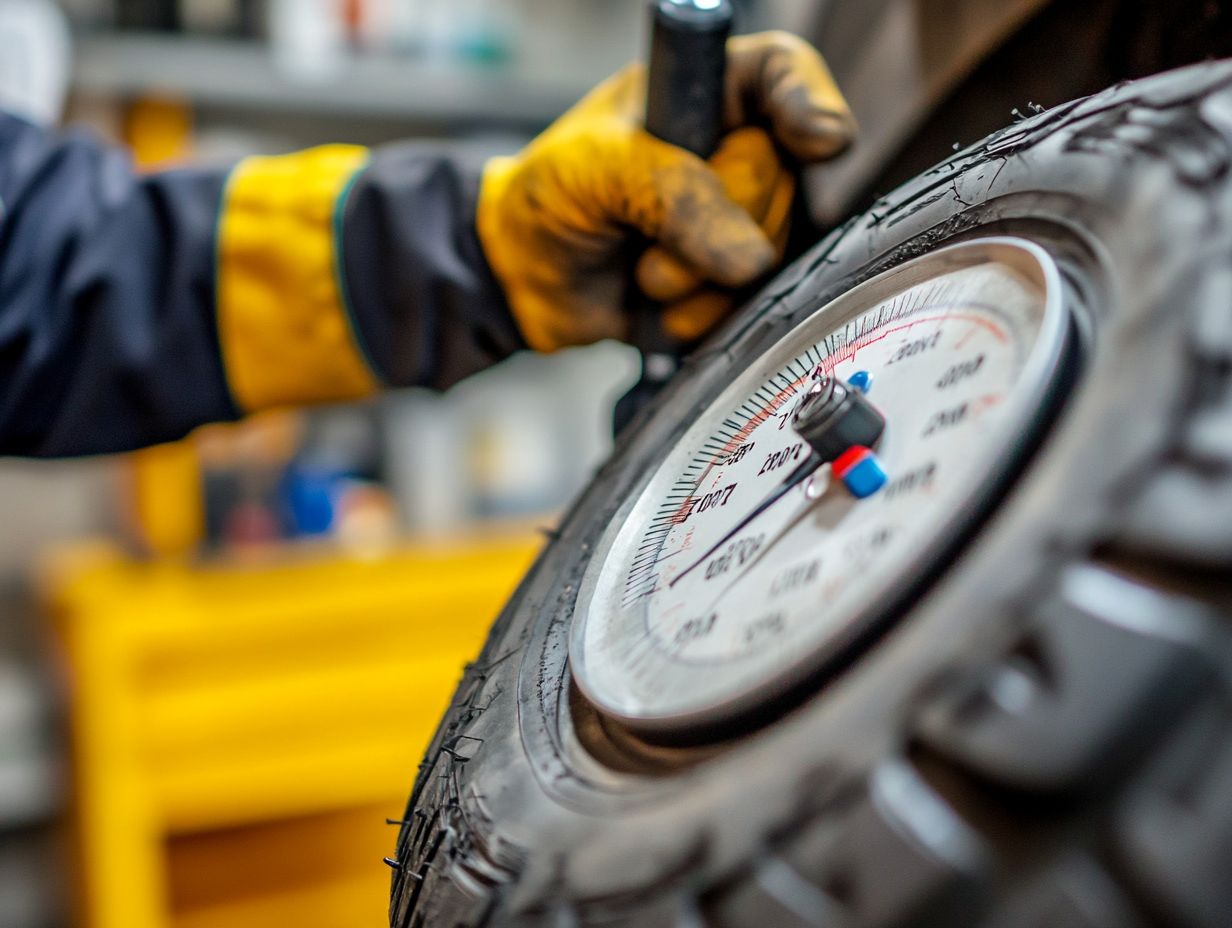
Your driving habits significantly influence tire wear. Aggressive maneuvers and sudden stops are major culprits of premature degradation.
Accelerating rapidly, braking hard, or navigating sharp turns puts undue pressure on your tires. These actions can lead to uneven tread wear, dramatically shortening the lifespan of your tires and affecting overall safety and performance.
Regularly checking your tire pressure and maintaining a steady speed while traveling can greatly enhance the longevity of your tires. Smoother driving practices like gradual acceleration and mindful braking help reduce wear and tear, promoting a safer driving experience while protecting your investment.
Special Considerations for Different Types of Tires
Different types of tires, such as winter tires and performance tires, come with unique maintenance requirements that are essential for optimal performance and safety.
Winter Tires
Winter tires are designed to perform well in cold and snowy conditions. They require specific maintenance to ensure safety and effectiveness.
These tires feature special patterns that enhance traction on icy surfaces, efficiently channeling away slush and water to minimize the risk of hydroplaning. The rubber composition remains flexible in frigid temperatures, providing superior grip compared to all-season tires.
To fully benefit from winter tires, regularly check tire pressure, monitor tread depth, and rotate them as needed. This proactive approach extends the lifespan of your tires and significantly boosts vehicle safety, ensuring secure and stable journeys in winter conditions.
Performance Tires
Performance tires are engineered for enhanced handling and deserve your utmost attention to keep their capabilities at peak levels.
These specialized tires provide superior grip, enabling sharper cornering and improved traction in both wet and dry conditions. Their design typically features a lower profile and stiffer sidewalls, reducing flex and resulting in quicker response times during maneuvers.
To maximize these benefits, regular maintenance is key. This involves:
- Checking tire pressure frequently,
- Rotating them according to manufacturer guidelines,
- Ensuring proper alignment.
By following these maintenance practices, you can significantly extend the lifespan of your performance tires while enhancing your vehicle’s overall safety and efficiency.
Frequently Asked Questions
1. How can I extend the life of my tires?
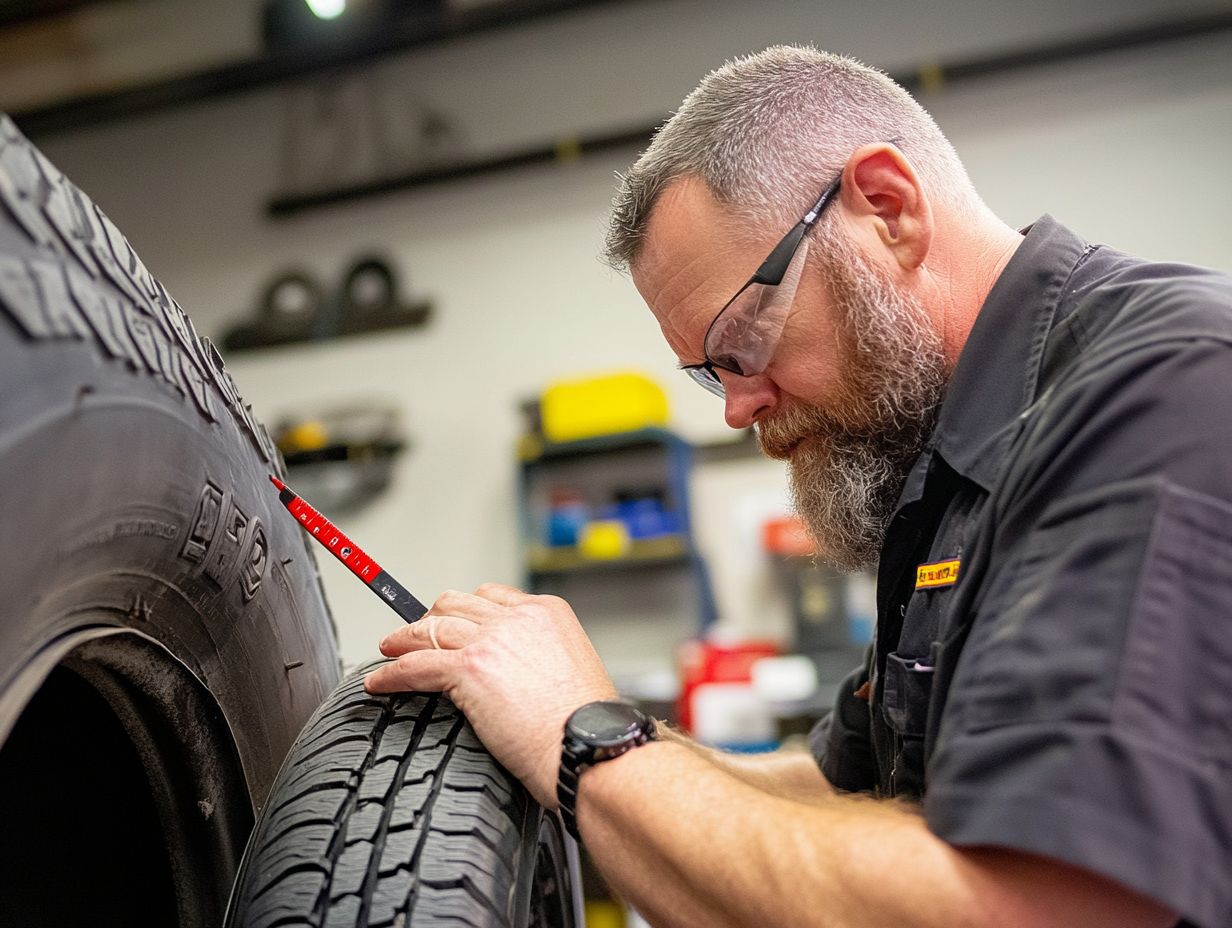
To extend your tire life, regularly check tire pressure, avoid overloading your vehicle, and stay informed about the best practices for tire care by keeping up with tire rotations and alignments.
2. Why is it important to maintain proper tire pressure?
Maintaining proper tire pressure helps extend tire life, improves fuel efficiency, enhances handling and braking, and reduces the risk of blowouts.
3. How often should I rotate my tires?
Tires should be rotated every 6,000 to 8,000 miles or every 6 months. Consult your vehicle’s manual for specific recommendations.
4. Can I extend the life of my tires by avoiding sharp turns and abrupt stops?
Avoiding sharp turns and abrupt stops can help extend tire life. These habits can cause uneven wear and lead to premature tire replacement.
5. Does the type of tire I choose affect its lifespan?
Yes, the type of tire you choose impacts its lifespan. High-quality, all-season tires tend to last longer than cheaper options, and tread patterns and materials also influence longevity.
Start your tire maintenance routine today!
6. What should I do if I notice abnormal wear on my tires?
Notice abnormal wear on your tires? Get them checked by a professional right away!
This could mean your tires aren t lining up correctly or that there are other problems. Don t ignore it addressing these issues can save your tires and enhance your safety on the road!


